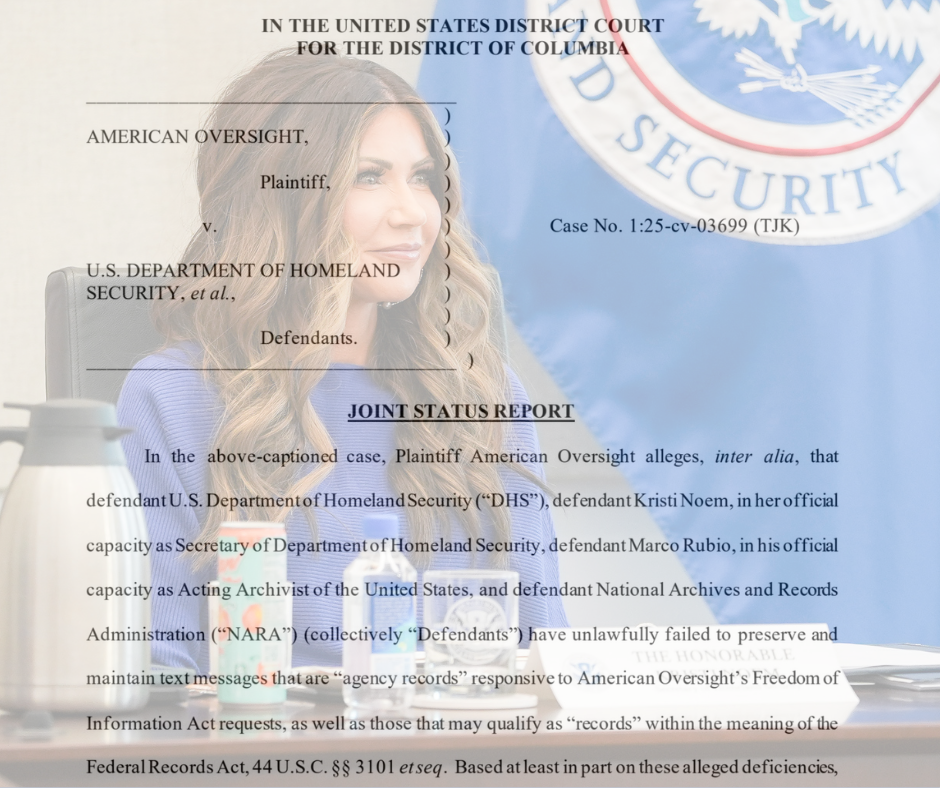Lawsuit Spurs DHS Notice to Noem, Other Top Officials Demanding Proper Records Preservation
DHS now says it has instructed officials to preserve their communication records.

On Friday, following a new court filing in American Oversight’s lawsuit against the Department of Homeland Security (DHS) over the agency’s initial claim that it failed to preserve the electronic messages of Secretary Kristi Noem and other top agency officials, the nonpartisan watchdog revealed that as a result of its litigation, DHS has issued a notice demanding that these officials “preserve documents and electronic records that relate to the subject matter of the complaint in this case.”
Additionally, while the Trump administration now claims it has archived and searched most of these officials’ devices, it is unable to confirm that those officials preserved all records responsive to American Oversight’s FOIA requests. This follows the government’s recent admission that its initial assertion that the electronic messages of top DHS officials were no longer preserved was “erroneous.”
“Weeks after admitting it provided ‘erroneous’ information about whether Secretary Noem and other senior DHS officials’ text messages were saved, DHS has finally put these officials on notice to follow the law and properly preserve these records, which belong to the American people,” said Chioma Chukwu, Executive Director of American Oversight. “These messages may shed light on decisions that profoundly impacted the lives of real families’ futures, led to wrongful deportations, and put vulnerable communities at risk. The public deserves to know the truth about the government’s actions, and we will continue pressing for answers and transparency.”
As part of today’s filing, the government has agreed to provide American Oversight with its forthcoming response to the National Archive and Records Administration’s (NARA’s) Sept. 3 letter directing DHS to investigate and explain how its record-retention policies for text messages comply with the Federal Records Act (FRA). DHS’s response should finally clarify whether its policies, as implemented, meet those legally mandated standards. NARA directed DHS to respond to its request for additional information within 30 days of the outcome of that investigation, which came during the government shutdown.
Importantly, federal law requires custodians to transfer electronic records from their devices into a searchable system within 20 days. DHS’s own declarations confirm that its current policies fall short of this requirement: neither its guidance nor its declarations identify any deadline — let alone the 20-day legal mandate — for transferring non-email electronic records from employee devices. Based on DHS’s earlier declarations, that transfer does not appear to have occurred for the text messages potentially responsive to American Oversight’s FOIA requests. And because DHS relies on employees to screenshot and self-archive many electronic messages — a method that is not centrally searchable, as the government’s declaration explains — this deficiency extends far beyond the records at issue here, affecting any electronic communication archived outside the government’s forensic tools. If accurate, this would mean DHS failed to follow a core requirement of the FRA — one specifically designed to prevent the loss of electronic messages — to ensure that messages are captured and transferred to a searchable location.
While DHS’s new declaration claims that most of the DHS officials’ devices were archived as of Nov. 14, the officials themselves did not attest that they preserved all records potentially responsive to American Oversight’s FOIA requests. If DHS responds to NARA as instructed — by explaining how its electronic message retention policies ensure text messages and messages on third-party platforms like Signal are “captured, managed and preserved” with their metadata so that DHS can “access and retrieve . . . electronic records, through electronic searches” — it should include clarification about how DHS ensures custodians’ compliance with the 20-day transfer deadline. Months after DHS first misled American Oversight about whether the records existed at all, the agency still has not demonstrated that the messages were preserved — making NARA’s demanded explanation all the more important.
In July, American Oversight submitted a FOIA request seeking the text, Signal, and email communications of Noem and other top DHS officials related to the National Guard’s questionable Los Angeles deployment to quell protests over the administration’s mass deportation agenda. In its July 23 response, DHS stated that it could not search for responsive records because “text message data generated after April 9, 2025, is no longer maintained.”
American Oversight submitted follow-up FOIA requests on Aug. 21 seeking the July 2025 text messages of Noem and other DHS leaders as well as records reflecting those messages. Just two and a half hours later, DHS responded with a categorical “no records” determination for each request, stating that it “no longer has the capability to conduct a search of text messages.”
In October, American Oversight filed a lawsuit against DHS based on the agency’s previous assertion that it failed to preserve text messages from Secretary Noem and other top DHS officials, as required by law. The nonpartisan watchdog also filed suit against the agency for failing to release text messages and other records that could shed light on DHS’s role in decisions ranging from military strikes and National Guard deployments in American cities to inhumane immigration enforcement and the upheaval of government operations.